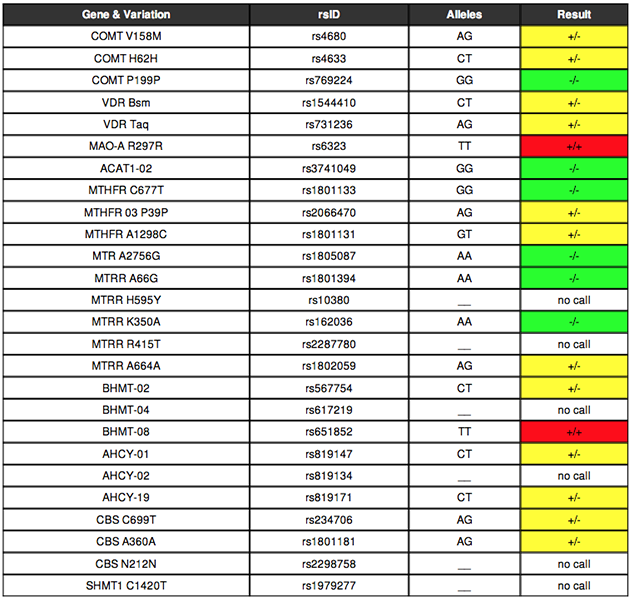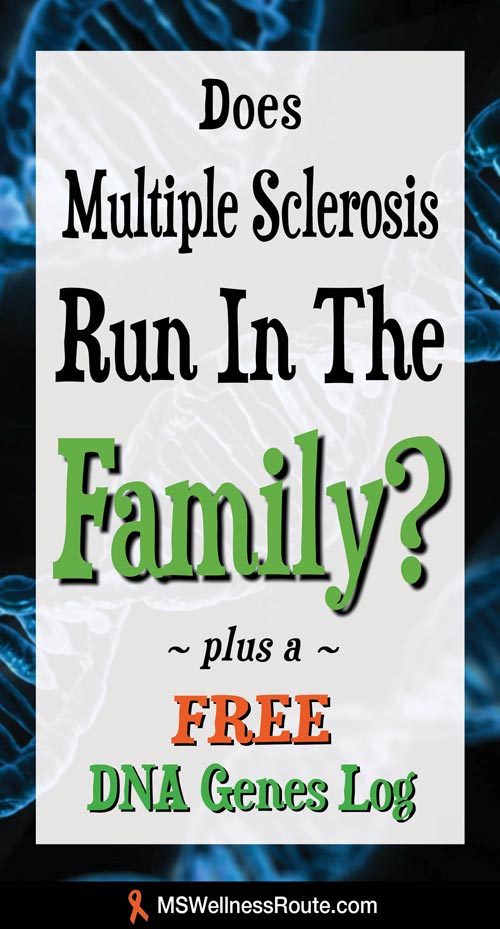Last Updated on November 16, 2023 by Cathy

Multiple sclerosis (MS) is a chronic neurological disease. It affects the central nervous system (CNS). It affects the brain, spinal cord, and optic nerves. Although MS is not considered a hereditary disease, it can run in the family.
People who have a direct relative with MS are at a higher risk of developing the disease. But, it is not a guarantee they will get MS. Studies found identical twins, only one developed MS and the other didn’t.
This proves genes aren’t the only contributing factor. I’ve been living with MS for decades. No one else in my family has MS besides me. When I had a DNA test several years ago it was shocking to see I had 3 times higher risk for MS.

If interested, I had my DNA tested at the request of my functional medical doctor through 23andMe. I learned a lot of information from my DNA including how my body down-regulates vitamin D. I guess that could explain why I had a vitamin D deficiency.
You need to get a vitamin D test since people with MS usually have a deficiency. Ask your doctor to get tested or use an online lab. I use Walk-In Lab since my insurance won’t pay for it. I found it to be more convenient and cheaper than going through my doctor.
When getting your Vitamin D tested don’t accept a “Normal” result instead get the actual number. Doctors use a 30-100 ng/mL score, your score should be between 60-80 ng/mL. It turned out that my score was 34.7 ng/mL which is low for normal. I’m now taking 5,000 UI of Vitamin D drops every day to get my numbers up.
Keep reading for a free “DNA Genes Log”
The National Multiple Sclerosis Society claims there are 4 factors in developing MS:
1 – Immunologic
MS is a disease that affects your brain, spinal cord, and optic nerves. It is the result of an abnormal immune response, the myelin sheath is being attacked. This breaks down the coating exposing the nerve fibers. This can create permanent neurological damage. Your brain no longer sends signals through your body. It causes symptoms from minor weakness to complete paralysis.
In two-thirds of patients, the first symptoms of MS generally start to appear between the ages of 20 and 40. Although it can happen at any age. There are four different types of MS, with each step getting steadily worse:
- Clinically Isolated Syndrome (CIS) – is the first sign of MS.
- Relapsing-remitting MS (RRMS) – is the most common. An MS patient has a relapse (attack or exacerbation) followed by complete recovery.
- Secondary progressive MS (SPMS) – no longer has a relapse but continues to get worse.
- Primary progressive MS (PPMS) – this is the most aggressive, 15% of people with MS have PPMS.
Today there are dozens of disease-modifying therapies (DMTs). However, these treatments are not able to stop the destruction of nerve tissue. Plus, they come with terrible side effects including:
- Brain infection
- Chemotherapy-like side effects
- Chest pain
- Depression
- Difficulty breathing
- Fatigue
- Flu-like symptoms
- Headache
- Heart damage
- Liver damage
- Muscle aches
- Pain at the injection site
- Suicidal thoughts
Keep reading for a free “DNA Genes Log”
2 – Environmental

While MS is not directly inherited researchers study patterns of the disease. They found certain factors that lead to MS. Such as age, ethnic background, gender, genetics, and geography.
Age: Most people are first diagnosed with MS between the ages of 20 and 50. Although it can happen at any age. I was 15 years old when I had my first MS symptom, optic neuritis.
Ethnic background: MS is most common in people of northern European ancestry.
Gender: Women are three times more likely to have MS than men. Researchers are not sure if it has something to do with hormones or the X chromosome. Men have one X chromosome (XY) while women have two (XX).
Geography: MS is more common in areas that are further away from the equator. However, this does not work for every area such as Key West, Florida. Children born in a low-risk area then moving (before age 15) to a high-risk area increases their risk. This leads researchers to believe vitamin D plays a huge role in developing MS. I take Vitamin D by Thorne.
The evidence also shows that smoking plays an important role in MS. Smokers have a greater risk of the more aggressive forms of MS. When they stop smoking the MS progression slows down.
Researchers also discovered clusters. Dr. Swank talks about this in his studies back in the ‘70s. Certain areas seem to have higher MS cases than others. The Pacific Northwest in the USA has an extremely high rate of people with MS. Is this caused by the air, water, local toxins, or diet, the reason is unknown.
3 – Infections
In January 2022, a 20-year study stated Epstein-Barr virus is the leading cause of MS. They studied more than 10 million active duty US military personnel. The researchers determined whether, and when, donors were infected with EBV.
From these samples 801 people went on to develop MS. They found a much higher rate of EBV among people who developed MS than people without MS. Out of the 801 MS cases, only one person tested negative for EBV. They calculated that people with EBV were 32 times as likely to develop MS as uninfected people.
The researchers found no such association between MS and any other human viruses.
However, 95% of all adults worldwide have EBV and only a small percentage have MS. This proves there is another factor involved. Researchers believe it has something to do with the HLA gene.
To learn more about the connection between MS and EBV read: Epstein-Barr Virus Is The Leading Cause Of MS
Besides EBV other considerations are bacteria and fungi. There are many links between fungi and diseases involving chronic inflammation.
In the 1980s, Dr. Truss’s book, The Missing Diagnosis brought attention to Candida. Then Dr. William Crook’s book, The Yeast Connection, talked about how Candida leads to diseases. By “starving” the yeast with a Candida diet people were able to reverse their illness including MS.
Candida symptoms include:
- Brain fog
- Craving for sweets
- Dandruff
- Digestive Issues
- Dizziness
- Fatigue
- Food sensitivities
- Hormone imbalance
- Jock itch
- Joint or muscle pain
- Leaky gut
- Mood swings
- Muscle stiffness
- Nail fungus
- Oral Thrush
- Sinus Infections
- Urinary Tract Infections (UTIs)
- Vaginal yeast infections
- Weakened immune system
4 – Genetics

The cause of MS includes genetic predisposition and environmental factors. Genes play a small role, it is mainly caused by environmental factors.
Environmental factors such as:
- Drinking cow’s milk
- EBV
- Obesity
- Organic solvents
- Smoking
- Vitamin D deficiency
- Working night shifts
Possible triggers to MS:
- Diet (processed foods, refined sugar, refined carbs, food allergies, etc.)
- Infections (bacterial overgrowth, parasites, viruses, and yeast overgrowth)
- Environmental Toxins (heavy metals, mold, pesticides, etc.)
- Chronic Stress (especially emotional stress)
- Hormones (cortisol, insulin, vitamin D – yes, it’s a hormone)
- Genetics (you can’t change your genes but you can change your gene expression by living a healthy lifestyle)
The HLA-DRB1*1501 allele group has the strongest genetic risk factor. The HLA gene is also a risk factor for fungi infections. One-quarter of the population carries the HLA gene. For these people, they will be the first to get sick from mold exposure and the last to recover.
Fungi infections include mycotoxins (mold) and yeast overgrowth (Candida). Yeast is a normal part of the human body. But, taking many rounds of antibiotics throws off the balance of good and bad bacteria. This allows the yeast to grow out of control and wreak havoc on the entire body.
Dr. Amy Yasko has worked with adults who have neurological conditions. Such as MS, Chronic Fatigue Syndrome, and Fibromyalgia. She believes certain genetic flaws (mutations) are then stressed by everyday conditions. Diets, medications, stress, infections, and toxins are possible triggers. Finding these genetic flaws, she’s able to make dietary and supplemental changes. This helps improve the overall health of her patients.
Genetic Test Results
I discovered I have two mutated genes and the HLA-DRB1*1501 gene. It said I had a “3x higher risk of multiple sclerosis,” which really surprised me. I guess having an MS risk does run in my family since I inherited the DNA from my parents.
Researchers now believe people with MS have a genetic predisposition. But it’s the environment (poor diet, stress, low vitamin D, infections, etc.) that triggers the disease. The picture below shows the results of my recent genetics test.

MAO-A R297R
The 1st mutated gene is MAO-A R297R, this gene affects our brains, like MS, Parkinson’s disease, or dementia. It depends on which Alleles you have, an allele is a variant form of a gene, I have TT (see photo above). It also depends on your gender, males are more aggressive and women are less aggressive and calmer.
The problem with MAO-A R297R is sulfites. The sulfur in our bodies turns into sulfites before processing into sulfates. Our bodies can’t break down the sulfites. The recommendation with a high sulfite/sulfate load is to eat a low-sulfur diet.
Also avoid nutrients that contain sulfur, including Epsom salt, in excess quantities. The recommendation with a high sulfite/sulfate load is to eat a low-sulfur diet. Also avoid nutrients that contain sulfur, including Epsom salt, in excess quantities.
BHMT-08
The 2nd mutated gene is BHMT-08, stress and cortisol levels affect this gene, it may play a role in ADD/ADHD. Scientists believe BHMT-04 plays a role in the gut environment. It’s related to the impact that psychological stress has on a person’s attention levels. Stress plays a major role in MS, studies have shown that stress can lead to MS flare-ups and worsen the disease.
Quick Links To Information In This Post:
T-Helper Cells (Th)
These cells are a vital part of the immune system, there are 2 different Th cells, Th1 & Th2. These two cells work together but they can get unbalanced, showing dominance to one or the other. If you have MS, Type 1 Diabetes, Grave’s, Crohn’s, or Celiac Disease you have the Th1 dominance. People with allergies, asthma, cancer, or Lupus, have Th2 dominance.
You can have blood work (Th1/Th2 cytokine) by your doctor to find out if you have an unbalanced system. An anti-inflammatory diet and avoiding stimulating compounds can help balance the Th levels.
Stress plays a huge role in MS, it’s a toxin that weakens the immune system. It is often the final straw to the onset of MS, it also causes flares. Work on lowering your stress.
When you’re using genetic data, you are not the result of your genes. You can change it through vitamins and supplements. If diet alone is helping you, that’s great! If you’re not, get your DNA tested.
Does MS Run in The Family?
MS is not an inherited disease but for some, it can run in the family. Just because MS does not run in your family you can still have a genetic risk. And just because you have a genetic risk it doesn’t guarantee a person will develop MS.
The National MS Society says:
“MS is not an inherited disease, meaning it is not a disease that is passed down from generation to generation. However, in MS there is a genetic risk that may be inherited.”
People can inherit a gene, like the HLA-DR gene but it doesn’t guarantee they will be affected by it.
Researchers discovered this when they studied identical twins. Being identical twins they would have identical genes. But, one would have MS while the other one didn’t. That’s why MS is mainly caused by environmental factors.
You can’t change your genes but you can change your gene expression by living a healthy lifestyle. Both genes and environment seem to play a role although genetics does play a smaller role. Don’t let MS continue to run in your family, have every eat and live and healthy lifestyle.
I got my DNA tested through 23andMe, you can read more about my experience here: DNA for Multiple Sclerosis

Get Your FREE DNA Genes Log
Get the password for the library with my Free DNA Genes Log here by filling out this form:
Want to Remember This Pin? Save This Pin To Your Favorite Pinterest Board!

Resources for Does MS Run in The Family?:
http://www.nationalmssociety.org/What-is-MS/What-Causes-MS
23andme.com
genecticgenie.org
http://selfhacked.com/2014/12/07/about-mao-a-and-what-to-do-if-you-have-the-warrior-gene/
http://autoimmune-paleo.com/how-do-you-balance-th1-and-th2-in-autoimmune-disease/
Does MS Run in The Family?





